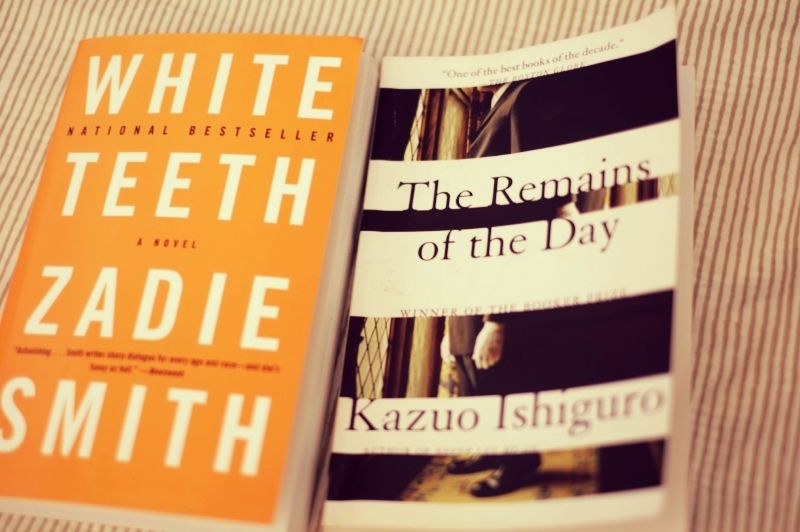
Harrowing times call for a retreat into solitude and fiction. This October I've only managed to read Kazuo Ishiguro's The Remains of the Day, which was a laborious read for the most part, probably due to the fact that mentally I was in a state of constant distraction. It was only upon coming to the end of the novel that I came to fully appreciate it. A story of commitment and sacrifice, and the lost concept of taking pride in your job – I highly recommend the book.
I also read Zadie Smith's White Teeth.
I don't know if you've read White Teeth and if you did, my condolences. Unless you enjoyed it, then we have nothing in common in regards to taste, and perhaps intelligence.
I started reading White Teeth with high hopes (first mistake, never allow awards and high praise from other individuals or literary organizations to determine how you feel about something before you've even tried it yourself), but as the story stretched on for what seemed like an eternity the painful truth began to sink in. The characters and issues "examined" in the novel became ridiculous and annoying. Her language convoluted and overblown. Smith's agenda against organized religion and tradition was dogmatic and typical of new atheists of this day, not to mention irresponsible in what it tried to portray through the pompously superior stance those of pseudo-intellectual backgrounds thrive on. What makes this even more cringe-worthy is the fact that she wrote the novel at the age of 22 (or 23...or let's just say when she was in her final year at Cambridge). That already sets off the alarm bells. (Mary Shelley wrote Frankenstein when she was nineteen, but those were different times, one could argue).
Why did I read a book written by someone lacking life experience and wisdom, who wrote a book nearly 500 pages long about issues as complex as culture, identity, religion, immigration, family, racism, science, all kneaded together until reduced to a white, pasty blob of nothing, I berated myself. Furthermore, I've come to conclude that books of unnecessary cruel length (Michael Chabon's The Amazing Adventures of Kavalier and Klay is another) (see also Dave Eggers' The Circle, a terrible novel) showcases the author's self absorbtion. Yes, apart from White Teeth being written through a narrow scope of naivete masked by ornate, flaunting sentence structure, it was like reading the rants and estimations of a twenty something hipster so far up their own ass, so in love with the sound of their own voice, commanding an audience of gullible readers who know next to nothing about what it's like being a minority or person of color in a major white-dominated setting. And Smith does nothing to accurately illustrate the reality of race issues in her country.
The whitewashing of the story is embarrassing even for fiction, which is why people love it and applaud the illusion successfully masquerading as reality. There is no violence, hate, or discrimination that exists in England, by Smith's fictional account, except for in the Iqbal family, a Bengali Muslim family so dysfunctional and morally bankrupt due to their own faults and weaknesses. While I did find humor throughout the novel, the caricatures presented as people were the worst element of the story. All of the parents are useless, irresponsible pushovers who have no idea how to raise their kids. Perhaps there is a point to that, in reflecting the good for nothing parents of today's society who neglect to instill any inkling of respect, manners or principles in their equally good for nothing offspring. And that's also my point - that such a pathethic upbringing is not a shared experience of all western or westernized Muslims. Yet Smith uses one family to generalize the idea that Muslims yearn to be white, western, and have no problem assimiliating or surrendering in British society.
To conclude, White Teeth is one of the worst books I've ever read, and I can't recommend against it enough. It is too weak and shortsighted in its juvenile efforts at tackling intricate problems of society and individual human struggles.
*To Smith's credit, she has since acknowledged that White Teeth was an embarrassing work from her younger years (she is now 39).
